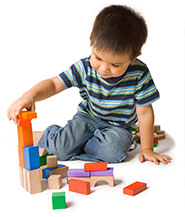Cognitive Development
 Development in the domain of cognition involves the processes by which young children grow and change in their abilities to pay attention to and think about the world around them.
Development in the domain of cognition involves the processes by which young children grow and change in their abilities to pay attention to and think about the world around them.
Infants and young children rely on their senses and relationships with others; exploring objects and materials in different ways and interacting with adults both contribute to children’s cognitive development. Everyday experiences and interactions provide opportunities for young children to learn how to solve problems, differentiate between familiar and unfamiliar people, attend to things they find interesting even when distractions are present, and understand how their actions affect others. Research in child development has highlighted specific aspects of cognitive development that are particularly relevant for success in school and beyond. These aspects fall under a set of cognitive skills called executive function and consist of a child’s working memory, attention and inhibitory control, and cognitive flexibility. Together, these skills function like an “air traffic control system,” helping a child manage and respond to the vast body of the information and experiences they are exposed to daily. The components within this domain address logic and reasoning skills, memory and working memory, attention and inhibitory control, and cognitive flexibility.
Children with disabilities may reach many of these same goals of cognitive development. For example, a child with a physical disability may require adaptive toys to explore cause-and-effect relationships and a child with a speech impairment may use augmentative and/or alternative communication devices to retell a familiar story or activity. Children with disabilities may each many of these same goals, but at a different pace, with a different degree of accomplishment, or in a different order than their peers. However, the goals for all children are the same, even though the path and the pace toward realizing the goals may be different. Principles of universal design for learning (UDL) offer the least restrictive and most inclusive approach to developing environments and curricula that best support the cognitive development of all children.
Remember:
While this domain represents general expectations for cognitive development, each child will reach the individual standards at their own pace and in their own way.
